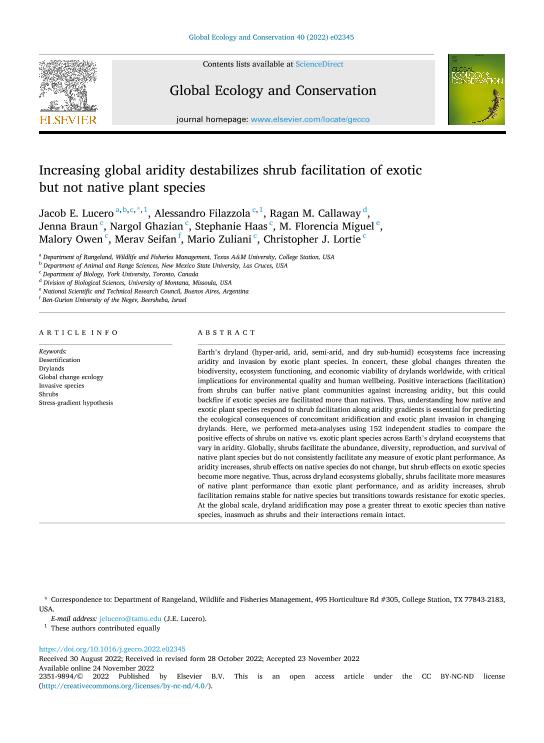Artículo
Increasing global aridity destabilizes shrub facilitation of exotic but not native plant species
Lucero, Jacob E.; Filazzola, Alessandro; Callaway, Ragan M.; Braun, Jenna; Ghazian, Nargol; Haas, Stephanie; Miguel, María Florencia ; Owen, Malory; Seifan, Merav; Zuliani, Mario; Lortie, Christopher J.
; Owen, Malory; Seifan, Merav; Zuliani, Mario; Lortie, Christopher J.
 ; Owen, Malory; Seifan, Merav; Zuliani, Mario; Lortie, Christopher J.
; Owen, Malory; Seifan, Merav; Zuliani, Mario; Lortie, Christopher J.
Fecha de publicación:
12/2022
Editorial:
Elsevier
Revista:
Global Ecology and Conservation
ISSN:
2351-9894
Idioma:
Inglés
Tipo de recurso:
Artículo publicado
Clasificación temática:
Resumen
Earth's dryland (hyper-arid, arid, semi-arid, and dry sub-humid) ecosystems face increasing aridity and invasion by exotic plant species. In concert, these global changes threaten the biodiversity, ecosystem functioning, and economic viability of drylands worldwide, with critical implications for environmental quality and human wellbeing. Positive interactions (facilitation) from shrubs can buffer native plant communities against increasing aridity, but this could backfire if exotic species are facilitated more than natives. Thus, understanding how native and exotic plant species respond to shrub facilitation along aridity gradients is essential for predicting the ecological consequences of concomitant aridification and exotic plant invasion in changing drylands. Here, we performed meta-analyses using 152 independent studies to compare the positive effects of shrubs on native vs. exotic plant species across Earth's dryland ecosystems that vary in aridity. Globally, shrubs facilitate the abundance, diversity, reproduction, and survival of native plant species but do not consistently facilitate any measure of exotic plant performance. As aridity increases, shrub effects on native species do not change, but shrub effects on exotic species become more negative. Thus, across dryland ecosystems globally, shrubs facilitate more measures of native plant performance than exotic plant performance, and as aridity increases, shrub facilitation remains stable for native species but transitions towards resistance for exotic species. At the global scale, dryland aridification may pose a greater threat to exotic species than native species, inasmuch as shrubs and their interactions remain intact.
Archivos asociados
Licencia
Identificadores
Colecciones
Articulos(IADIZA)
Articulos de INST. ARG DE INVEST. DE LAS ZONAS ARIDAS
Articulos de INST. ARG DE INVEST. DE LAS ZONAS ARIDAS
Citación
Lucero, Jacob E.; Filazzola, Alessandro; Callaway, Ragan M.; Braun, Jenna; Ghazian, Nargol; et al.; Increasing global aridity destabilizes shrub facilitation of exotic but not native plant species; Elsevier; Global Ecology and Conservation; 40; 12-2022; 1-8
Compartir
Altmétricas



